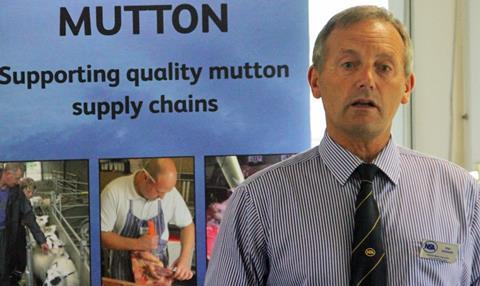Both the National Sheep Association (NSA) and the National Farmers Union Scotland (NFUS) have criticised Environment Secretary George Eustice over a “lack of understanding” on the subject of sheep farming in the UK and how it might be impacted by a no-deal Brexit.

Eustice appeared on the BBC’s ‘Andrew Marr Show’ and highlighted the potential impact of tariffs should the UK and the European Union fail to negotiate a free-trade agreement (FTA).
He also conceded that UK sheep farmers could be the hardest hit if a deal could not be secured in the next few weeks and encouraged them to diversify into beef.
NSA chief executive, Phil Stocker, said: “Mr Eustice’s comments will have angered many of our nation’s sheep farmers, failing to identify the unique and varied nature of sheep enterprises across the country. To begin with, to suggest that many of our sheep farmers are mixed farmers is wrong. This assumption will enrage sheep farmers across the UK who have structured their farms to focus on sheep, and it will particularly antagonise our devolved nations where the landscape includes more remote areas of countryside, especially suited to sheep, and where buildings, machinery and farm infrastructure simply would not suit a sudden switch to cattle farming.
“If a deal cannot be reached then support must be made available to farming businesses which have their incomes impacted as a result of any arising disruption caused."
“The fact we have many sheep farmers, especially younger farmers and new entrants to the sector who run their sheep on arable farms and on short term grass lets was completely ignored – simply switching to cattle would be impossible for them.
“I find it hard to think that George Eustice really believes what he said, and this interview leaves us thinking his comments could either be part of creating a ‘we don’t care’ attitude to bolster trade negotiations, or, and this would be highly concerning, that it exposes an underlying willingness to see our sheep industry go through a restructure to reduce its size, scale and diversity.
“Our sector is in a great place to benefit from a growing global demand for sheepmeat. The country’s sheep farmers work hard to supply a product that is predominantly ecological agriculture in nature, fed on grass and part of the creation of our iconic countryside. To allow British sheep farming to potentially be permanently damaged because the transition agreements to enable us to change to a different global supply chain aren’t put in place would be an act of negligence on behalf of our Government.”
NFUS
Commenting on the Minister’s interview, NFU Scotland president, Andrew McCornick, said: “Failure to recognise the huge impact that imposition of tariffs under a ‘no deal’ would have on many agricultural sectors has caused significant anger and frustration in what potentially is a landmark week for negotiations.
“The Minister’s remarks ignored the commonly held understanding of the impact that a ‘no deal’ outcome would have on the thousands of farming and food businesses across the United Kingdom.
“Suggesting that in the event of ‘no deal’, sheep producers could simply ‘diversify into beef’ to protect themselves from market disruption showed a lack of understanding of sheep production in much of Scotland. It should have been obvious to the Minister that sheep farmers, who will be hammered by ‘no deal’, cannot simply avoid this outcome by diversifying into another sector of production by 1 January 2021.
“In this crucial week, we have written to the Minister about his statements asking him to provide urgent clarity to farmers, crofters and growers that the Westminster Government fully recognises the potential impact of a ‘no deal’ scenario – and to remind them that the Government must do all it can to agree a deal that would avoid the imposition of tariffs on our exports.
“If a deal cannot be reached then support must be made available to farming businesses which have their incomes impacted as a result of any arising disruption caused – we have received commitments from the UK Government on this in the past and I hope these commitments still stand.”
This story was originally published on a previous version of the Meat Management website and so there may be some missing images and formatting issues.















